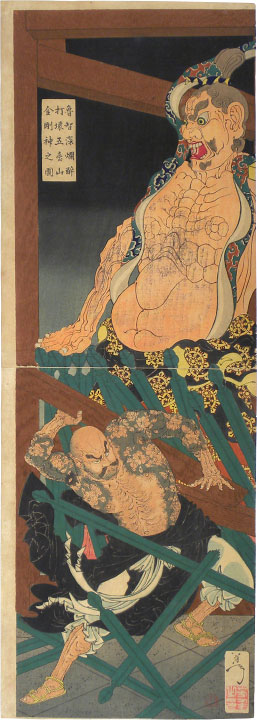

Tsukioka Yoshitoshi, 1839-1892
Picture of Rochishin in a Drunken Rage Demolishing a Guardian Statue on Mount Godai
(Rochishin ransui Godaisan Kongojin o uchikowasu no zu)
with a dusting of mica on the upper sheet, with shomen-zuri (printing from the front) burnishing and embossing the texture of a woven fabric on Rochishin's black robe; signed Yoshitoshi, artist's seal Yoshitoshi no in, carved by Negishi Chokuzan, publisher and date seal faded or rubbed out, however, the printing embellishments and crispness of the impression along with the spacing of the faint kanji on the margin (and a comparison of the last few characters under magnification) indicates this appears to be from the earliest edition published by Matsui Eikichi of Kakuhakudo in 1887
oban tate-e vertical diptych 29 1/2 by 10 3/8 in., 75 by 26.3 cm
SOLD

Tsukioka Yoshitoshi, 1839-1892
Picture of Rochishin in a Drunken Rage Demolishing a Guardian Statue on Mount Godai
(Rochishin ransui Godaisan Kongojin o uchikowasu no zu)
signed Yoshitoshi, with artist's seal Yoshitoshi no in, carver's seal Negishi Chokuzan, and publisher's seal Hasegawa Tsunejiro dated Meiji nijunen, kyugatsu, ichika (Meiji 20 [1887], September 1) of Shimizuya Tsunejiro
oban tate-e vertical diptych 29 3/8 by 10 1/8 in., 74.6 by 25.7 cm
SOLD
From 1885-1889 Yoshitoshi produced fifteen vertical diptychs with the publisher Matsui Eikichi who had been a student of Yoshitoshi in ca. 1865 when he was 12 or 13 years old. Eikichi was not a particularly prolific publisher, and sold the blocks of twelve of the designs rather quickly to the larger publisher Hasegawa Tsunejiro. Oddly, while the Hasegawa versions change the publication date to September 1, 1887, for this design both versions bear that same publication date. In comparing these impressions, the earlier versions have a dusting of mica and texture embossed on Rochishin's black robe; while the later printings differentiate the color of the statue with a darker mercurial pigment and highlight the swirling folds of the robe with white pigment.
Rochishin (Ch. Lu Chi Shen) is an anti-hero from the Japanese adaptation of Tales of the Water Margin (Suikoden), a 16th-century collection of stories considered to be one of the classics of Chinese literature. Rochishin, often called the Flower Priest for his plum blossom tattoos, had been a military captain named Rotatsu who had acted rashly when he killed a butcher who was abusing his own mistress. The mistress' father advised Rotatsu to take the monk's name Rochishin and retire to the monastery on Mount Godai. Once on the mountain, he became widely feared for robbing merchants and drinking heavily, the latter of which activities was often followed by vomiting and relieving himself in the temple. After taking time to gather their courage, the monks forced him out of the monastery, at which point Rochishin joined a gang of thieves.
Perhaps unsurprisingly, the life of a robber suited him well. He soon returned to the Mount Godai monastery to expel a rival gang of thieves who had found refuge within the temple walls. In this composition, Yoshitoshi depicts Rochishin in a drunken rage at the temple entrance beneath the kongojin (Buddhist guardian deity). The misguided outlaw, consumed by destructive fury, throws his weight against a heavy foundation beam as broken guardrails which had surrounded the statue come crashing down. Above, the open-mouthed guardian seems to scream in protest as it teeters on its base, threatening Rochishin from above.
References:
Keyes 1983, p. 479, no. 498
Segi 1985, p. 72, no. 89
Akita Museum of Modern Art 1999, p. 33, no. 108
Newland & Uhlenbeck 2011, p. 124, no. 90
Iwakiri 2014, p. 146, no. 218






